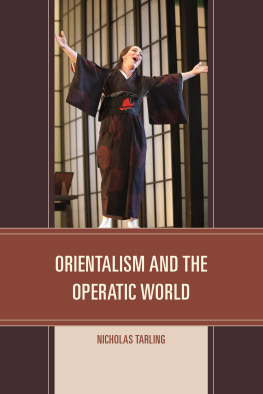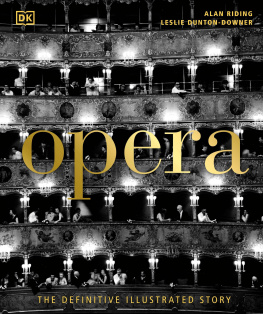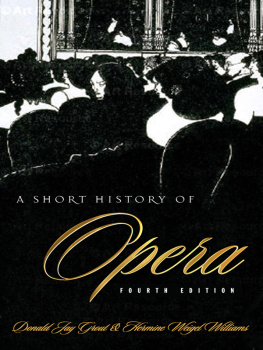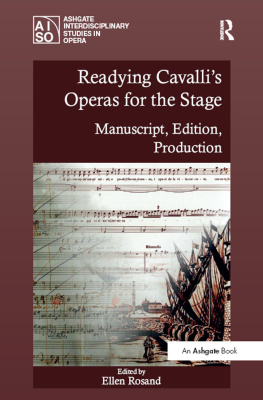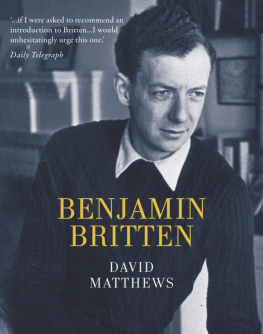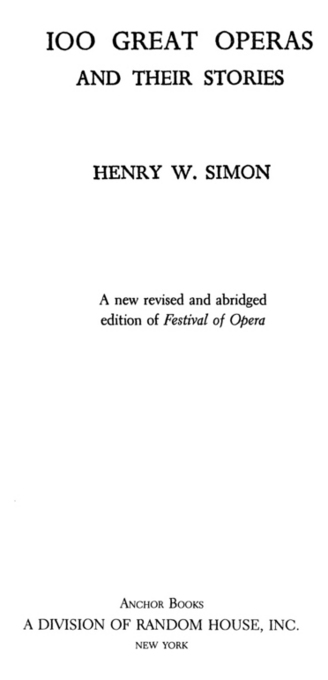First Anchor Books Edition, 1989
Copyright 1957, 1960 by Doubleday
All rights reserved under International and Pan-American
Copyright Conventions. Published in the United States by Anchor
Books, a division of Random House, Inc., New York, and simultaneously in Canada by Random House of Canada Limited, Toronto. 100 Great Operas was originally published as Festival of Opera in the United States by Doubleday, a division of Random House, Inc., in 1957. The Anchor Books edition is published by arrangement with Doubleday, a division of Random House, Inc.
Anchor Books and colophon are registered trademarks
of Random House, Inc.
Library of Congress Cataloging-in-Publication Data
Simon, Henry W. (Henry William), 19011970.
100 great operas and their stories / by Henry W. Simon.
A new rev. and abridged ed., 1st Anchor Books ed.
p. cm.
Rev. and abridged ed. of: Festival of opera. 1957.
1. OperasStories, plots, etc. I. Simon, Henry W.
(Henry William), 19011970. Festival of opera. II. Title.
III. Title: One hundred great operas and their stories.
MT95.S59 1989 88-36697
782.13dcl9
MN
eISBN: 978-0-307-77370-8
www.anchorbooks.com
v3.1
FOR ROZ
CONTENTS
PREFACE
AN APOLOGY FOR SMILING
Every one of the stories in this book isor, at least, once wasgood. I say this with confidence because no composer who ever lived would take the time and trouble to write a score for a story he knew to be bad. In fact, most opera composers, today as in the past, spend a large part of their time and care looking for a good story to setand composers are men with outsize I.Q.s. If they werent, they could never master the intricacies of writing a score.
Why, then, should there be so prevalent a conviction among our literate population that practically the lowest form of literature is the opera libretto and that there is nothing quite so ludicrous as an opera story? For there is no getting away from the fact that many of the stories in this book include basic or incidental absurdities.
Here, then, is the explanation. There are, first of all, a number of opera stories, like Pelleas and Melisande or Gianni Schicchi, which not only were good to begin with but remain good in the operatic telling. Then there are great stories from mythology, like the Orpheus, the Electra, and the Trojan War legends; there are Bible stories, like Samsons and Salomes; there are historical stories like Godounoffs and King Gustaves; there are stories based on great plays like Goethes Faust and Shakespeares Othello; there are stories derived from stage hits like Sardous Tosca and Belascos Butterfly; and there are even a few entirely original tales written by the composers themselves, like Leoncavallos Pagliacci and Menottis Amahl.
But some operatic stories have, with time, come to seem hopelessly old-fashioned; others have been ruined for us by the vagaries of stage life and even of political life. Thus, the story of Camille (La Traviata) once seemed so violent and realistic an attack on sexual morals as to shock our British grand- or great-grandfathers a hundred years ago into banning it, whereas today it strikes us as a sentimental or at best a quietly touching romance; while the libretto of A Masked Ball struck Verdis original censors as so forceful a lesson in regicide that they fastened magnificent absurdities upon it even before the musical score was completed.
In retelling these stories for this book, I have tried, in my introductory notes and in the telling of the stories themselves, to explain some of these absurdities, even to highlight them when doing so might suggest to the reader a greater sympathy with the work of art he is asked to consider. For these operas are all works of art which (with a few exceptions) have had the vitality to survive on the stage whether or not a modern audience can take the story as seriously as the composer must have before he set the words to music. Under the spell of great music well performed, the willing suspension of disbelief that Coleridge demanded for poetry is more easily come by when whatever nonsense may occur on the stage has already been forgiven and when one can throw oneself under the spell of the words, the action, the scenery and the music in the way the composer could have wished.
H.W.S .
THE ABDUCTION FROM THE SERAGLIO
(Die Entfhrung aus dem Serail)
Opera in three acts by Wolfgang Amadeus
Mozart with libretto in German by Gottlob
Stephanie based on a play by Christoph
Friedrich Bretzner
| KONSTANZE , a Spanish lady | Soprano |
| BLONDCHEN , her English maid | Soprano |
| BELMONTE , a Spanish nobleman | Tenor |
| PEDRILLO , his servant | Tenor |
| SELIM PASHA | Speaking part |
| OSMIN , overseer of his harem | Bass |
Time: 16th century
Place: Turkey
First performance at Vienna, July 16, 1782
Mozart composed The Abduction from the Seraglio at one of the happiest times in his short life. He was barely twenty-six; he was very much in love with Konstanze Weber; he was engaged to marry her and, in fact, he did so just a little over three weeks after the operas premiere. In addition, the first name of his fiance was the name of the heroine of the story of the opera. All this delight, I like to think, is reflected in the music of the opera.
It isnt really so much an opera as what the Viennese of the time called a Singspiel, that is, a gay play with music. All of the action is carried on with spoken dialogue, and the characters break into song only to express strong emotions, seldom to further the story. One important character, the Pasha, does not sing at all but only speaks.
Eighteenth-century Vienna was crazy about Turks. There were Turkish dress styles, Turkish hair-dos, Turkish stories, and a great deal of Turkish musicor what the Viennese thought was Turkish music. Some of the pianos even had tiny drum and bell attachments to make Turkish effects. The story and music of The Abduction were part of this Turkish fad. It concerns a high-minded Pasha of the sixteenth century, who captures a beautiful English maiden, Konstanze, and her maid Blondchen (meaning little blonde), and also Pedrillo, the servant of a young Spanish nobleman named Belmonte.
OVERTURE
The overture, a familiar piece in concert halls, reflects the contemporary Turkish fad: it makes prominent use of both the triangle and the bass drum. Gay in mood, as the overture to any Singspiel should be, it offers a moment of sweet sadness by including, in a minor key, the young heros opening aria.
ACT I
Without waiting for a conclusion to the overture, the curtain rises on Belmonte, the noble young Spanish hero of the story. He has reached a seaside plaza outside the palace of the Pasha, and he sings of his hope of finding Konstanze there (Hier soll ich dich denn sehen, KonstanzeHere may I hope to find you, Konstanze). An unpleasant old fellow named Osmin appears. He is picking figs in the garden and singing a ditty about unreliable sweethearts



